 Mountain Burmese is originated from Myanmar but Yochon is originated from United States. Mountain Burmese may grow 43 cm / 17 inches higher than Yochon. Mountain Burmese may weigh 60 kg / 133 pounds more than Yochon. Mountain Burmese may live 6 years less than Yochon. Both Mountain Burmese and Yochon has same litter size. Mountain Burmese requires Low Maintenance. But Yochon requires Moderate Maintenance
Mountain Burmese is originated from Myanmar but Yochon is originated from United States. Mountain Burmese may grow 43 cm / 17 inches higher than Yochon. Mountain Burmese may weigh 60 kg / 133 pounds more than Yochon. Mountain Burmese may live 6 years less than Yochon. Both Mountain Burmese and Yochon has same litter size. Mountain Burmese requires Low Maintenance. But Yochon requires Moderate Maintenance
Basic Information
Group:
Sporting dog
Toy dog
undefined
Myanmar
United States
Weight Male:
58 - 69 kg
127 - 153 pounds
Weight Female:
36 - 48 kg
79 - 106 pounds
Life Span:
6 - 8 Years
10 - 14 Years
Other Names:
Burmie
Bichyorkie • Borkie • Yo-Chon • Yochon • Yorki-Chon • Yorkichon • Yorkiechon • Yorkie-Chon • Yorkie-Bichon • Yorkshire Frise
Colors Available:
Black with white and red
Black, Blonde, Brown, Cream, Dark, Brown, Golden, Gray, White
Coat:
self-cleaning, double coat
silky or curly very full coat
Temperament:
Affectionate, Intelligent, Loving, Loyal
Alert, Energetic, Friendly, Independent, Intelligent, Loving, Playful
Grooming:
Low Maintenance
Moderate Maintenance
Trainability:
Easy
Moderate
New Owners Friendly:
Yes
Yes
History
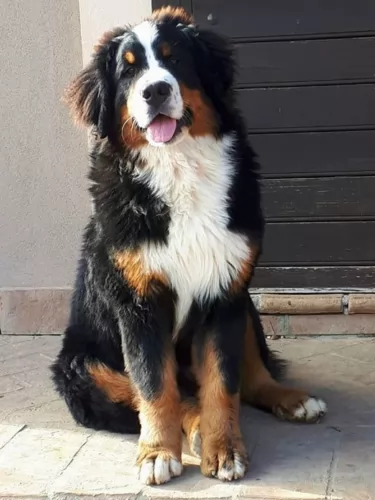 The Burmese Mountain Dog is quite often taken to be the Bernese Mountain Dog, a Swiss farm dog. However, the Burmese Mountain Dog comes not from Switzerland but from Myanmar and Burma. The Burmese was bred to hunt skunks and guard livestock for the northern tribesman of Myanmar. The way they hunted for the aggravating skunks was to hide themselves in the underbrush and wait for the skunk to go by. Their facial markings confuse skunks when they see him in the bush with a black and white face. At the same time, his rust color lets the hunter know he is the dog not the skunk.
The Burmese Mountain Dog is quite often taken to be the Bernese Mountain Dog, a Swiss farm dog. However, the Burmese Mountain Dog comes not from Switzerland but from Myanmar and Burma. The Burmese was bred to hunt skunks and guard livestock for the northern tribesman of Myanmar. The way they hunted for the aggravating skunks was to hide themselves in the underbrush and wait for the skunk to go by. Their facial markings confuse skunks when they see him in the bush with a black and white face. At the same time, his rust color lets the hunter know he is the dog not the skunk.
The Mountain Burmese is an incredible athlete despite the size. They are agile. They are quick. They can climb trees – as many as fifty feet while chasing a skunk. They also make a great companion and love to be a family dog. They are calm and gentle as an adult and great with kids. They are easily trained but remember they can climb trees. However, they do not do well with cats that are black and white or solid black because they confuse them with the skunk prey.
The Yochon is a “designer dog” – a cross between the Yorkshire Terrier and the Bichon Frise. They are not a purebred and are not recognized by purebred dog clubs such as the American Kennel Club (AKC). They are small, playful, families dogs. Most of them bear the best characteristics of each of their founding breeds, but because they are crossbreeds and most will be multi-generational cross breeds, there are no two dogs alike.
Though not recognized by the traditional purebred clubs they are recognized by several hybrid canine clubs. The cross was developed in the United States.
Description
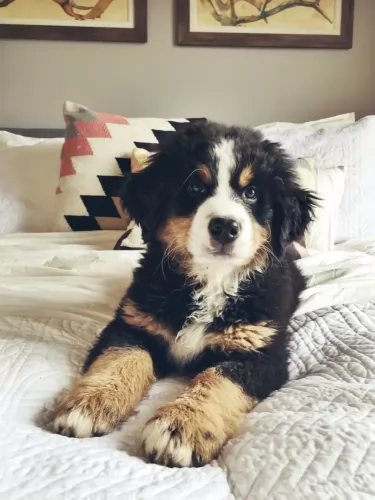 The Mountain Burmese Dog is a large, sturdy, well built and athletic canine. Strong and well balanced, he is agile and athletic when it comes to the work, he has to do in chasing skunks. He has a full body with a large head and dark, oval eyes. The Burmese has triangular ears close to his head and medium in size. With a flat, broad skull the muzzle is straight and strong. They have black noses and a scissors bite, on their muscular, strong neck. With a deep chest and broad back, they have strong ribs. Finally, the tail is bushy, long and hangs low.
The Mountain Burmese Dog is a large, sturdy, well built and athletic canine. Strong and well balanced, he is agile and athletic when it comes to the work, he has to do in chasing skunks. He has a full body with a large head and dark, oval eyes. The Burmese has triangular ears close to his head and medium in size. With a flat, broad skull the muzzle is straight and strong. They have black noses and a scissors bite, on their muscular, strong neck. With a deep chest and broad back, they have strong ribs. Finally, the tail is bushy, long and hangs low.
Yochons go by many different names but in general they are toy dogs, weighing in at under 20 pounds, most weighing 6-12 pounds. They have black noses, long tails, and round eyes. Their muzzles are blunt and their skulls are also round.
They have fluffy, full coats that can range from tan, to brown to black. They can also be white or cream. Their ears can be either hanging or erect.
Characteristics
Children friendliness
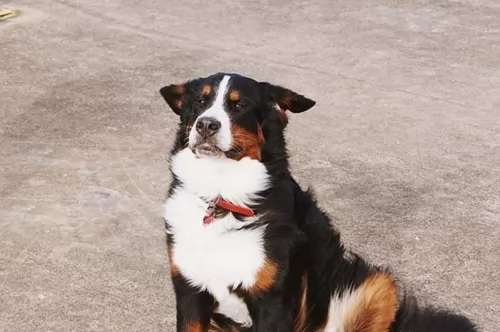 Yes, they are great with kids.
Yes, they are great with kids.
Special talents
Hunting skunks and climbing trees.
Adaptability
Yes, but they need a lot of space.
Learning
Ability is high. They are very intelligent and trainable.
1 Children friendliness -yes very good but watch careful that children do not hurt them as they are so small and fragile.
2.Special talents – Loves families and playing
3.Adaptability – adapts well to apartments can play indoors
4.Learning ability – intelligent and independent
Health Problems
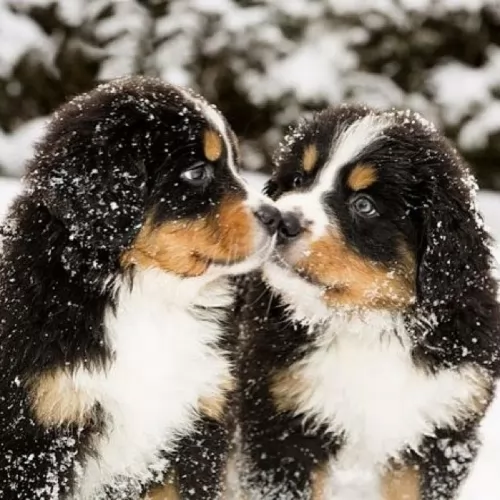 The kind of health issues that most large or giant dogs have to deal with are some of the same things that this breed dealt with.
The kind of health issues that most large or giant dogs have to deal with are some of the same things that this breed dealt with.
- Hip and Elbow Dysplasia – Can cause arthritis and lameness.
- Blood Disorders
- Cancers -various
- Progressive Retinal Atrophy – can cause blindness.
- Bloat - Fatal
- Heat Stroke – Can be fatal. Watch her in the heat.
Both founding breeds are vulnerable to a few medical conditions. These include:
• Legg-Calve-Perthes Disease – insufficient blood to hind legs, thigh bones causing lameness.
• Patellar Luxation – slipped kneecaps can also cause lameness.
• Dental Issues – keep teeth brushed and cleaned.
• Hypothyroidism – can be treated with medication.
• Reverse Sneezing
• Allergies
• Collapsed Trachea due to small size – be careful with them at all times.
Caring The Pet
Feeding the puppy
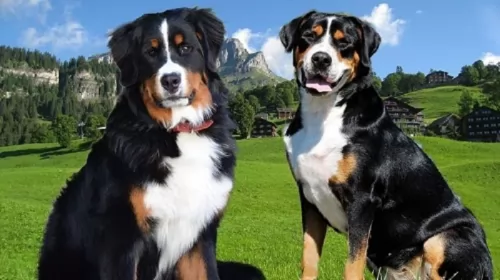 Feed a high quality dog food designed for large or giant puppies. Feed 3times a day 2.5 times for puppies and go easy on the treats
Feed a high quality dog food designed for large or giant puppies. Feed 3times a day 2.5 times for puppies and go easy on the treats
Feeding the adult
There is a definite tendency for these dogs to become obese. Don’t overfeed. Don’t free feed. Large breed high quality dog food should be fed 2 times a day and go easy on the treats. Watch his weight.
Points for Good Health
strength, stamina
Games and Exercises
The breed is definitely athletic and active. They love to chase and take long walks daily. They need a large yard but be careful as they can climb trees and your fence. They are great companions when backpacking and camping. If there are skunks in the area however watch out! These are hunting dogs despite their size and they would do very well in barn hunt and field trials.
3.Feeding the puppy – do not overfeed. Use a high quality puppy toy breed kibble. Feed 3-4 X day.
2.Feeding the adult – do not overfeed. Use a high quality adult toy breed kibble. Feed at least twice a day.
3.Points for Good Health hearty/general good health and stamina
4. Games and Exercises does not need a lot of exercise . They enjoy obedience and agility trials.
Comparison with other breeds
- Mountain Burmese vs English Bulldog - Breed Comparison
- Mountain Burmese vs German Shepherd - Breed Comparison
- Mountain Burmese vs Golden Retriever - Breed Comparison
- Mountain Burmese vs Labrador Retriever - Breed Comparison
- Mountain Burmese vs West Highland White Terrier - Breed Comparison
- Mountain Burmese vs French Bulldog - Breed Comparison
- Mountain Burmese vs Beagle - Breed Comparison
- Mountain Burmese vs Yorkshire Terrier - Breed Comparison
- Mountain Burmese vs Poodle - Breed Comparison
- Mountain Burmese vs Rottweiler - Breed Comparison
- Mountain Burmese vs Boxer - Breed Comparison
- Mountain Burmese vs English Pointer - Breed Comparison
- Mountain Burmese vs Siberian Husky - Breed Comparison
- Mountain Burmese vs Doberman Pinscher - Breed Comparison
- Mountain Burmese vs American Bully - Breed Comparison
- Mountain Burmese vs Abruzzenhund - Breed Comparison
- Mountain Burmese vs Affenpinscher - Breed Comparison
- Mountain Burmese vs Afghan Hound - Breed Comparison
- Mountain Burmese vs Aidi - Breed Comparison
- Mountain Burmese vs Airedale Terrier - Breed Comparison
- Mountain Burmese vs Akbash Dog - Breed Comparison
- Mountain Burmese vs Akita - Breed Comparison
- Mountain Burmese vs Africanis - Breed Comparison
- Mountain Burmese vs Askal - Breed Comparison
- Mountain Burmese vs Atlas Terrier - Breed Comparison
- Yochon vs English Bulldog - Breed Comparison
- Yochon vs German Shepherd - Breed Comparison
- Yochon vs Golden Retriever - Breed Comparison
- Yochon vs Labrador Retriever - Breed Comparison
- Yochon vs West Highland White Terrier - Breed Comparison
- Yochon vs French Bulldog - Breed Comparison
- Yochon vs Beagle - Breed Comparison
- Yochon vs Yorkshire Terrier - Breed Comparison
- Yochon vs Poodle - Breed Comparison
- Yochon vs Rottweiler - Breed Comparison
- Yochon vs Boxer - Breed Comparison
- Yochon vs English Pointer - Breed Comparison
- Yochon vs Siberian Husky - Breed Comparison
- Yochon vs Doberman Pinscher - Breed Comparison
- Yochon vs American Bully - Breed Comparison
- Yochon vs Abruzzenhund - Breed Comparison
- Yochon vs Affenpinscher - Breed Comparison
- Yochon vs Afghan Hound - Breed Comparison
- Yochon vs Aidi - Breed Comparison
- Yochon vs Airedale Terrier - Breed Comparison
- Yochon vs Akbash Dog - Breed Comparison
- Yochon vs Akita - Breed Comparison
- Yochon vs Africanis - Breed Comparison
- Yochon vs Askal - Breed Comparison
- Yochon vs Atlas Terrier - Breed Comparison
 Petzlover
Petzlover Mountain Burmese is originated from Myanmar but Yochon is originated from United States. Mountain Burmese may grow 43 cm / 17 inches higher than Yochon. Mountain Burmese may weigh 60 kg / 133 pounds more than Yochon. Mountain Burmese may live 6 years less than Yochon. Both Mountain Burmese and Yochon has same litter size. Mountain Burmese requires Low Maintenance. But Yochon requires Moderate Maintenance
Mountain Burmese is originated from Myanmar but Yochon is originated from United States. Mountain Burmese may grow 43 cm / 17 inches higher than Yochon. Mountain Burmese may weigh 60 kg / 133 pounds more than Yochon. Mountain Burmese may live 6 years less than Yochon. Both Mountain Burmese and Yochon has same litter size. Mountain Burmese requires Low Maintenance. But Yochon requires Moderate Maintenance The Burmese Mountain Dog is quite often taken to be the Bernese Mountain Dog, a Swiss farm dog. However, the Burmese Mountain Dog comes not from Switzerland but from Myanmar and Burma. The Burmese was bred to hunt skunks and guard livestock for the northern tribesman of Myanmar. The way they hunted for the aggravating skunks was to hide themselves in the underbrush and wait for the skunk to go by. Their facial markings confuse skunks when they see him in the bush with a black and white face. At the same time, his rust color lets the hunter know he is the dog not the skunk.
The Burmese Mountain Dog is quite often taken to be the Bernese Mountain Dog, a Swiss farm dog. However, the Burmese Mountain Dog comes not from Switzerland but from Myanmar and Burma. The Burmese was bred to hunt skunks and guard livestock for the northern tribesman of Myanmar. The way they hunted for the aggravating skunks was to hide themselves in the underbrush and wait for the skunk to go by. Their facial markings confuse skunks when they see him in the bush with a black and white face. At the same time, his rust color lets the hunter know he is the dog not the skunk. The Mountain Burmese Dog is a large, sturdy, well built and athletic canine. Strong and well balanced, he is agile and athletic when it comes to the work, he has to do in chasing skunks. He has a full body with a large head and dark, oval eyes. The Burmese has triangular ears close to his head and medium in size. With a flat, broad skull the muzzle is straight and strong. They have black noses and a scissors bite, on their muscular, strong neck. With a deep chest and broad back, they have strong ribs. Finally, the tail is bushy, long and hangs low.
The Mountain Burmese Dog is a large, sturdy, well built and athletic canine. Strong and well balanced, he is agile and athletic when it comes to the work, he has to do in chasing skunks. He has a full body with a large head and dark, oval eyes. The Burmese has triangular ears close to his head and medium in size. With a flat, broad skull the muzzle is straight and strong. They have black noses and a scissors bite, on their muscular, strong neck. With a deep chest and broad back, they have strong ribs. Finally, the tail is bushy, long and hangs low. The kind of health issues that most large or giant dogs have to deal with are some of the same things that this breed dealt with.
The kind of health issues that most large or giant dogs have to deal with are some of the same things that this breed dealt with. Feed a high quality dog food designed for large or giant puppies. Feed 3times a day 2.5 times for puppies and go easy on the treats
Feed a high quality dog food designed for large or giant puppies. Feed 3times a day 2.5 times for puppies and go easy on the treats